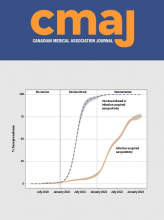Antipsychotic medications are commonly used in hospital for the management of patients with delirium
Delirium occurs in 30%–50% of adults aged 65 years or older admitted to hospital, and may be hypoactive (lethargy, reduced psychomotor functioning), hyperactive (agitation, hallucinations) or mixed.1 Twenty-nine percent of patients with delirium admitted to hospital in the United States are newly started on antipsychotic medications.2
Antipsychotic medications should not be used as standard treatment for delirium
Delirium management includes addressing underlying causes, optimizing environmental factors and implementing nonpharmacologic interventions.1 A 2019 systematic review reported no difference between antipsychotic medications and placebo on delirium duration or severity, length of hospital stay or mortality.3 Most studies did not differentiate hypoactive from hyperactive delirium or examine the impact of antipsychotic medications on patient and family experience.
Antipsychotic medications may be considered for patients with delirium experiencing severe agitation or distress
Antipsychotic medications may be used for patients with delirium who are at risk of self-harm, harming others or compromising essential medical therapy, or for patients with psychotic symptoms experiencing substantial distress.4 They are preferred over benzodiazepines, except for specific indications such as delirium associated with alcohol or benzodiazepine withdrawal.1 Antipsychotic medications should not be used for hypoactive delirium.4
Assessment of individual risks and benefits is warranted prior to use given serious adverse effects
The adverse effects of antipsychotic medications include sedation, hypotension, falls, parkinsonism, QT interval prolongation and aspiration pneumonia.4 Antipsychotic selection should consider adverse effects, desired outcome, relative contraindications and preferred administration routes (Appendix 1, available at www.cmaj.ca/lookup/doi/10.1503/cmaj.230227/tab-related-content).
Frequent reassessment of treatment should be undertaken for dose reduction or discontinuation
Many patients are discharged from hospital on newly prescribed antipsychotic medications without a clear indication for ongoing treatment.5 They should be prescribed at the lowest effective dose for the shortest possible duration and be reevaluated at or shortly after discharge.
Footnotes
Competing interests: Christina Reppas-Rindlisbacher reports support from the Canadian Institutes of Health Research Vanier Scholarship Program and the Eliot Phillipson Clinician-Scientist Training Program at the University of Toronto. Lesley Wiesenfeld reports institutional support as the chief of psychiatry at Sinai Health and an honorarium for speaking at a geriatric psychotherapy national conference. She is chair of the Mental Health and Incapacity panel for the College of Physicians and Surgeons of Ontario. No other competing interests were declared.
This article has been peer reviewed.
Disclaimer: Nathan Stall is an associate editor with CMAJ and was not involved in the editorial decision-making for this article.
This is an Open Access article distributed in accordance with the terms of the Creative Commons Attribution (CC BY-NC-ND 4.0) licence, which permits use, distribution and reproduction in any medium, provided that the original publication is properly cited, the use is noncommercial (i.e., research or educational use), and no modifications or adaptations are made. See: https://creativecommons.org/licenses/by-nc-nd/4.0/











